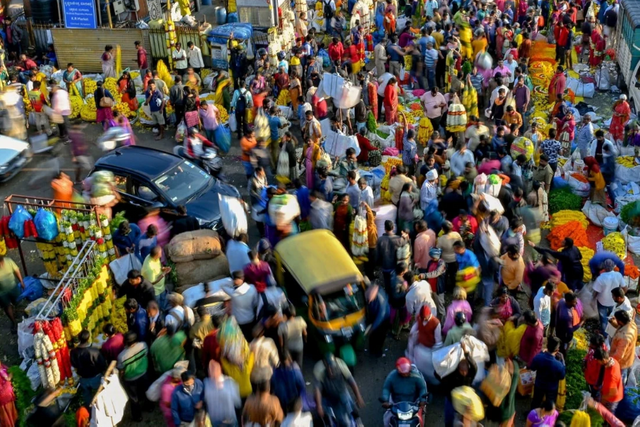The world's population has surpassed 8 billion and we must work together to protect the environment and close the development gap

On November 15, the world’s population passed the milestone of 8 billion people. Despite a declining growth rate in the past few decades, the global population is projected to surpass 9 billion around 2037 and 10 billion around 2058, according to the United Nations.
An expanding world population may exacerbate environmental problems and deepen the economic divide between developed and developing countries. The rate at which human beings are using natural resources exceeds the capacity of these resources to regenerate. Greenhouse gas emissions remain above the level required to limit global warming to 1.5 degrees Celsius. Biodiversity will gradually diminish because of the expansion of agricultural land and human settlements.
The above environmental problems are largely caused by human activity. As the global population increases, so will the consumption of resources and carbon emissions unless these pressing issues are addressed in a timely and effective manner.
In addition, the gap between developed and developing countries will continue to widen. Rapid population growth and widespread poverty often go hand in hand in developing countries.
For instance, middle-income countries, mostly in Asia, accounted for most of the population growth over the past decade, adding about 700 million people since 2011. India has added about 180 million people and is set to overtake China as the world’s most populous country next year. However, in 2021, an estimated 828 million people globally were affected by hunger and some 2.3 billion people worldwide experienced moderate or severe food shortage.
Meanwhile, developed countries have benefited from the low cost of labour and products manufactured in the developing world. An Oxfam report in 2020 found that the richest 10 per cent of the world’s population accounted for over half the emissions added to the atmosphere between 1990 and 2015. All this suggests that developed countries enjoy a greater demographic dividend but developing countries bear the consequences.
Mahatma Gandhi once said, “The world has enough for everyone’s needs, but not everyone’s greed.” The world population reaching the 8 billion milestone calls for all of us to make a concerted effort to protect the environment and minimise the developmental disparity among countries so we can achieve sustainable development together.
Despite the efforts of the public, businesses and the Hong Kong government, our city still predominantly relies on landfills to dispose of its municipal solid waste. However, Hong Kong is already grappling with a shortage of land for housing, and our two main landfills will be filled by the mid-2020s if the amount of waste continues to grow at the current rate.
The Hong Kong government has been promoting waste reduction and recycling. It has passed or strengthened regulations and laws related to the environment and educated the public, but the results have been limited.
The quantity of municipal solid waste disposed of in 2020 decreased only by 2.2 per cent compared to 2019, with commercial and industrial waste production decreasing by 12 per cent and domestic waste production increasing by 4.4 per cent.
The government should enforce more regulations to limit the amount and type of waste created by goods sold in the market – even if it hurts businesses in the short term. It should require both imported and domestic goods to only use materials that can degrade quickly.
Schemes such as the Green Label locally and the Global Ecolabelling Network internationally certify products based on how green the manufacturing process is. The Environmental Protection Department could collaborate with these organisations and set clear standards for products available in the market here.
A more extreme method would be to directly limit the type of material used in packaging. Large companies have a financial incentive and enough research and development capacity to opt for eco-friendly materials – for example, in May, Bonaqua launched bottles without labels to improve the recyclability of the container. However, any rules rolled out should be extended to smaller companies too.
While companies have a duty to make a profit for their shareholders, if the government offers incentives and educates the public about choosing green products, it would motivate companies to comply.